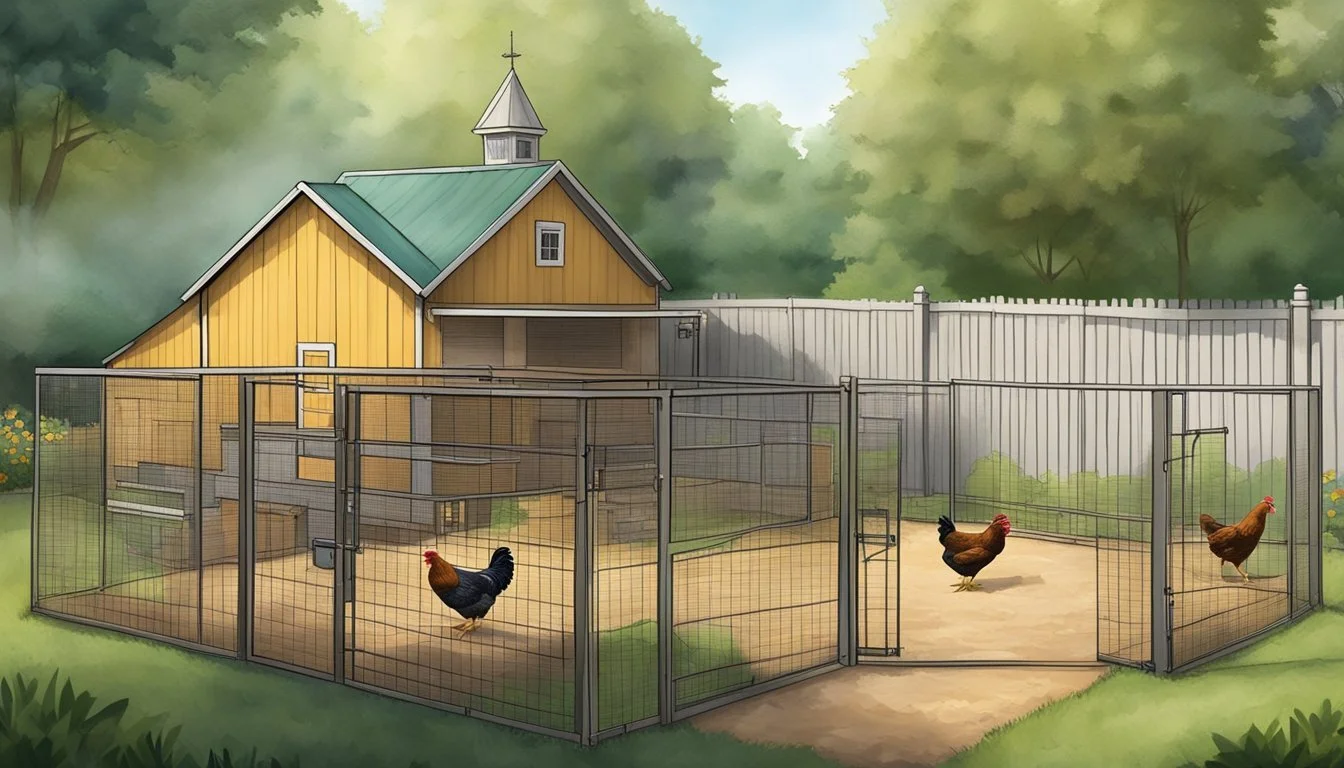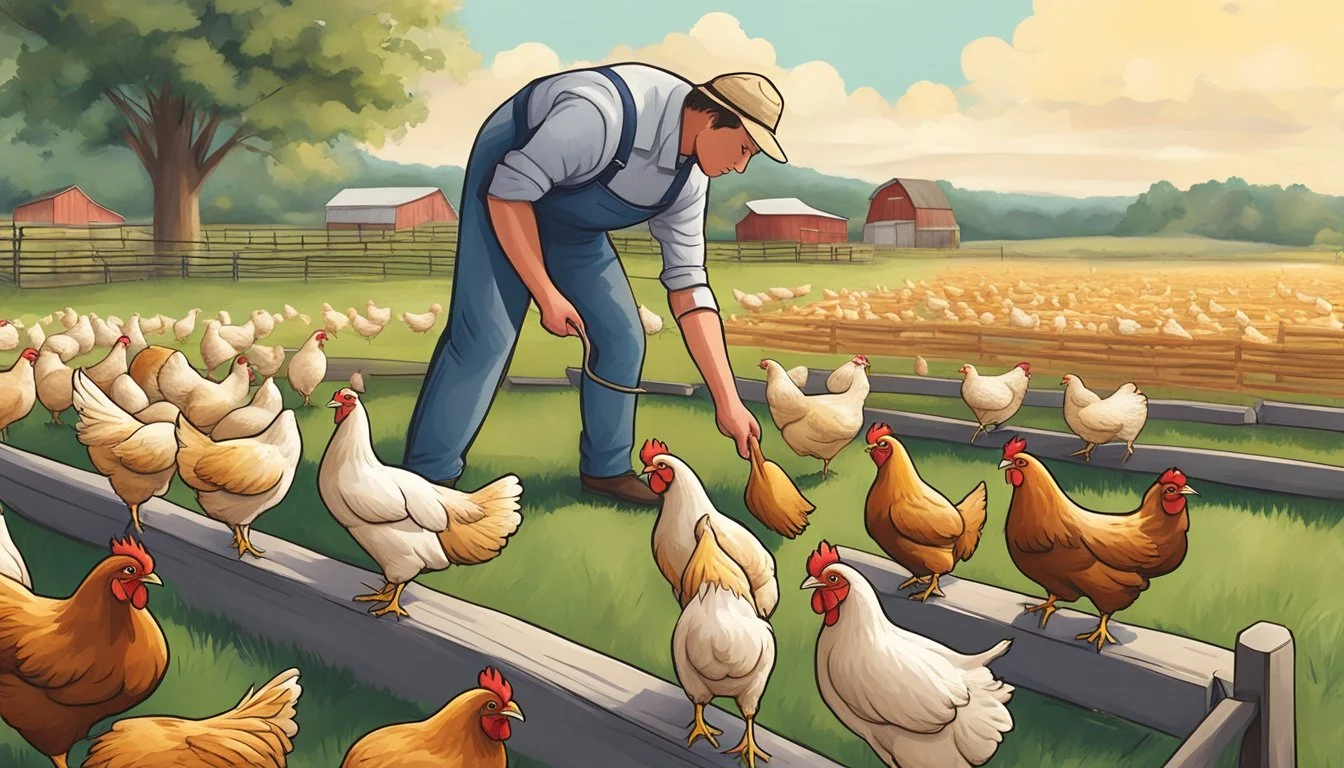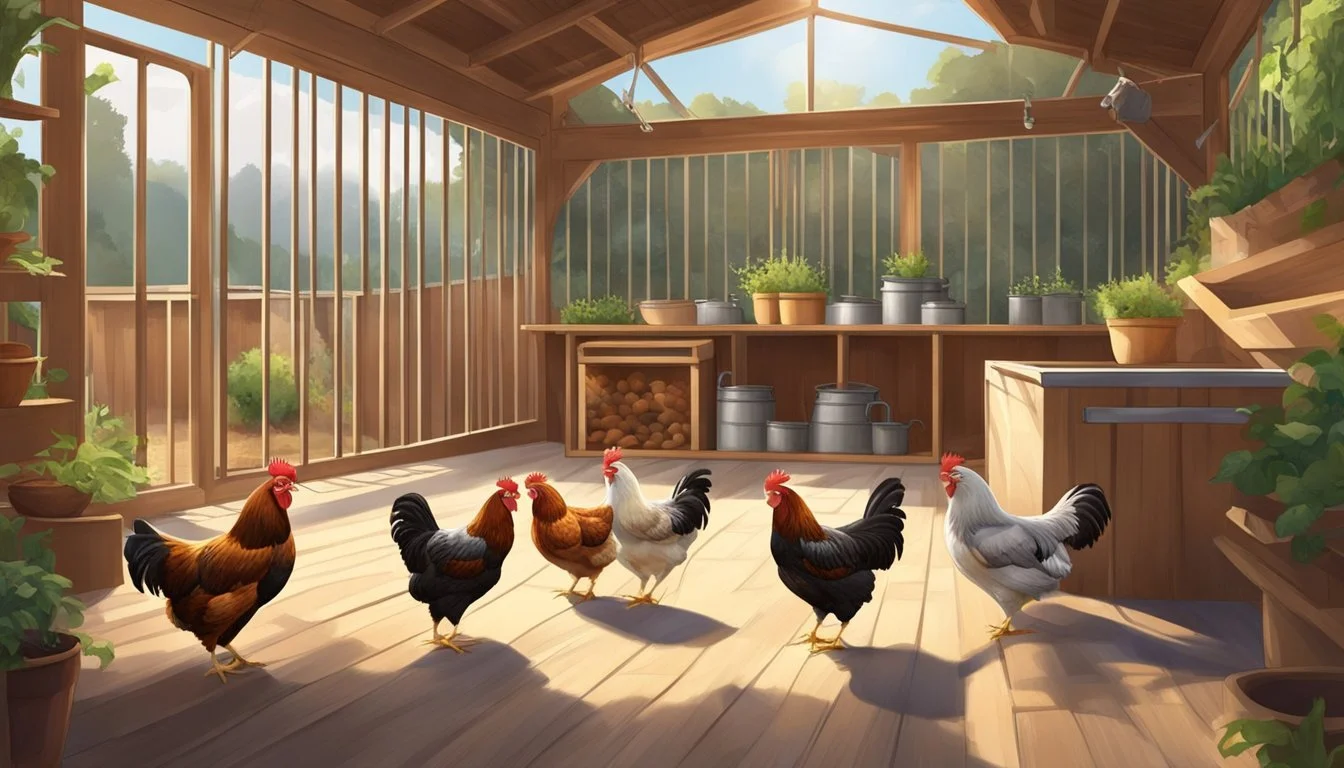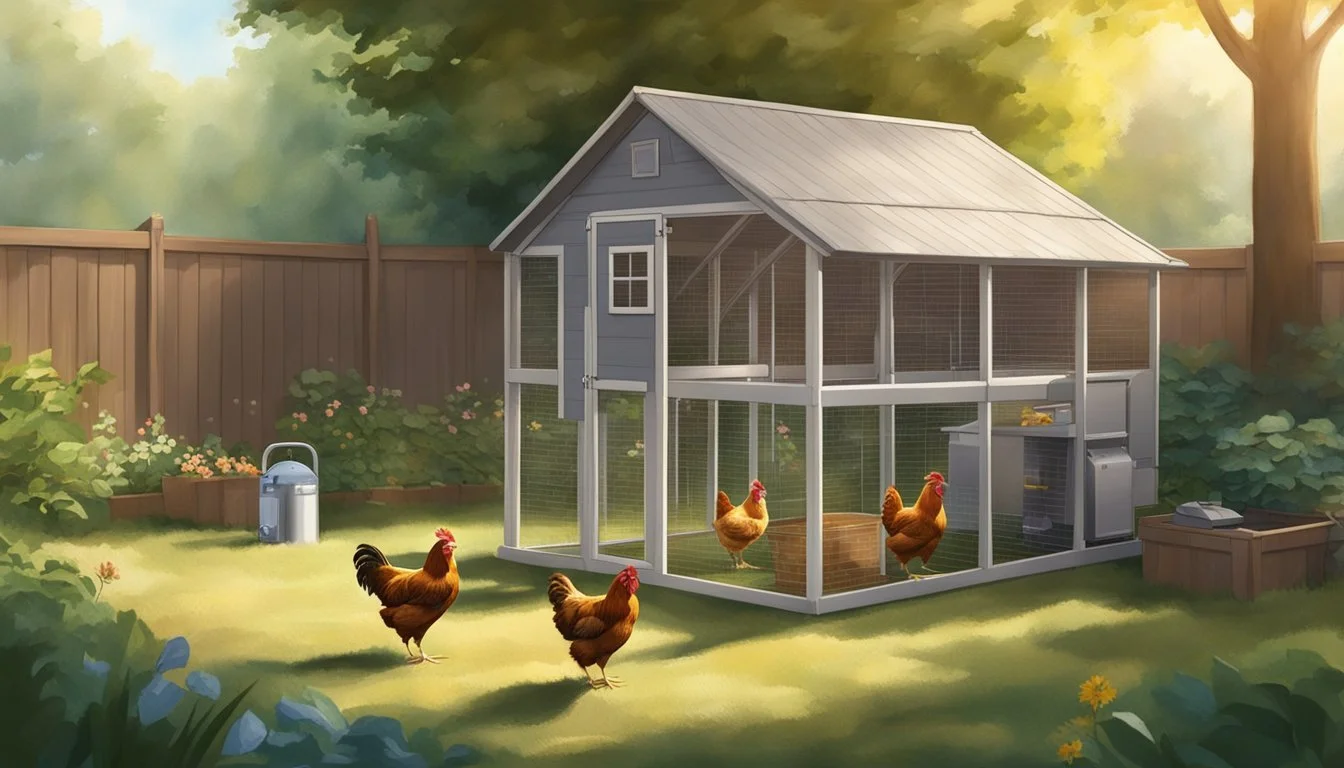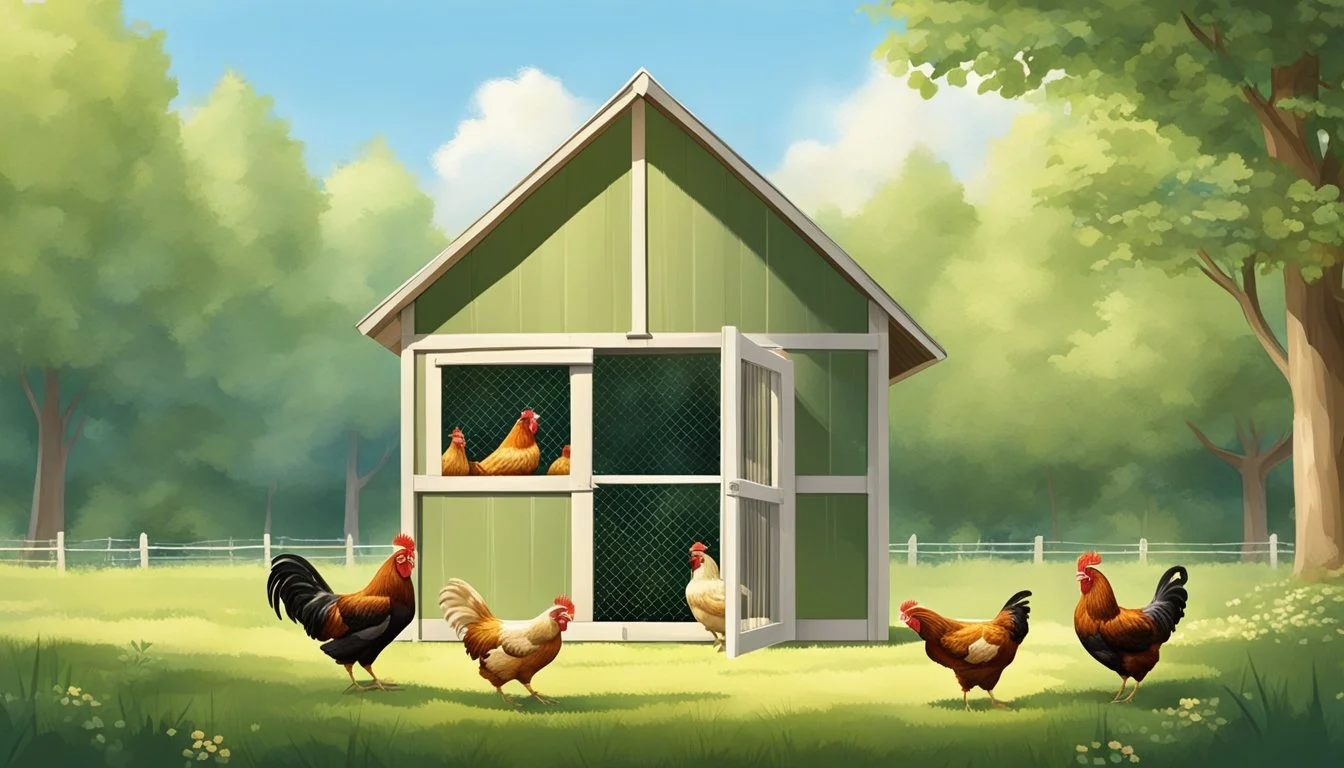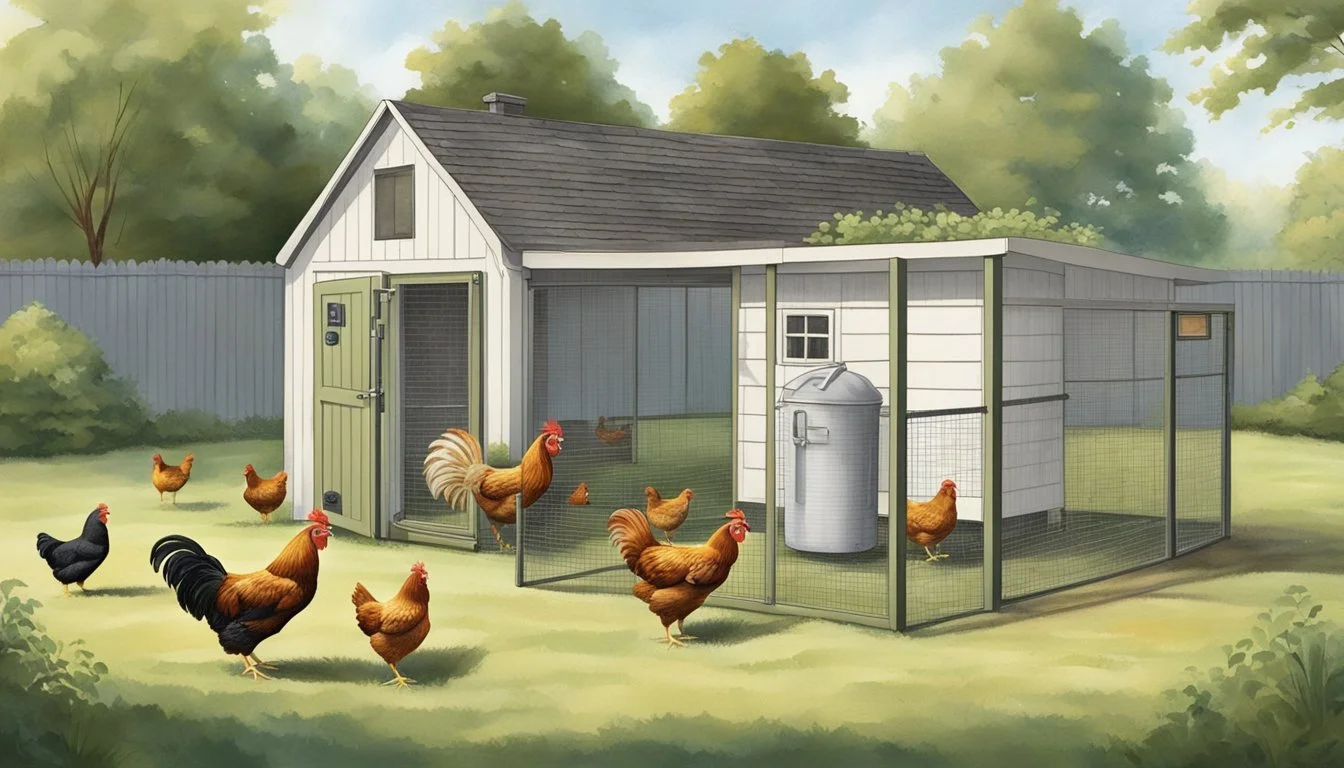Raising Backyard Chickens in Cleveland, TN
A Guide to Urban Poultry Farming
Raising backyard chickens has become an increasingly popular endeavor for many residents in Cleveland, Tennessee. Known for its tight-knit community and a penchant for self-sufficiency, Cleveland offers a suitable environment for beginners and experienced poultry enthusiasts alike. The benefits of this hobby are multifaceted, including access to fresh eggs, natural pest control, and the joy of connecting with these animals. In Cleveland, aspiring poultry keepers can find a variety of chicken breeds suitable for their backyards, from the hardy ISA Browns to the distinctive Silkies.
Before embarking on this rewarding venture, locals are encouraged to become familiar with any relevant ordinances and regulations regarding the keeping of chickens within city limits. Understanding the legal framework ensures that chicken raising is in harmony with the community standards. Equally important is learning about the specific needs of the chickens, such as proper shelter, nutrition, and healthcare. Chickens require a safe coop to protect them from predators, consistent access to water and balanced feed, and an environment that promotes their natural behaviors.
In Cleveland, individuals often share their experiences and knowledge, which fosters a supportive environment for newcomers to the world of backyard chickens. From discussions at local hobby stores to online community forums, resources are abundant for those seeking advice. Access to local expertise allows for a smoother transition into raising chickens, enabling Clevelanders to cultivate a rewarding relationship with their feathered friends and enjoy the fruitful experience of urban poultry farming.
Understanding Local Regulations
When considering the undertaking of raising backyard chickens in Cleveland, TN, residents must navigate and comply with specific local regulations to ensure their endeavor aligns with community standards. The city of Cleveland does not provide explicit ordinances online; therefore, individuals interested in keeping chickens are directed to contact the animal control unit for comprehensive and current information.
Key Contact:
Animal Control Unit: 423-559-3333
Before setting up a coop, potential chicken owners should understand the importance of these regulations, which are designed to balance urban living with agricultural practices, respect neighbors' privacy rights, and maintain the welfare of the animals.
Here are some general guidelines often found in municipal regulations for backyard chickens:
Rooster Prohibition: Roosters are usually not permitted in residential areas due to noise concerns.
Enclosure Requirements: Chickens must be kept in a secure and clean coop to prevent them from roaming and becoming a nuisance.
Lot Size: Certain municipalities enforce restrictions based on the size of the property.
Quantity Limit: There might be a limit on the number of chickens one can keep.
It is imperative for residents to adhere to the privacy policy of their local community by respecting property lines and ensuring that chicken coops do not intrude on neighbors' privacy.
Cleveland residents are encouraged to perform due diligence by consulting with the aforementioned animal control unit to obtain detailed, legal parameters and any necessary permits before starting their backyard chicken flock. This proactive approach will contribute to a harmonious relationship between the chicken owners and the broader Cleveland community.
Selecting the Right Chicken Breeds
When considering raising backyard chickens in Cleveland, TN, selecting the right breeds is crucial. Breed choice affects temperament, egg production, and the birds' suitability for the local climate.
Temperament and Egg Production
Temperament is a key factor since it influences how chickens integrate into their environment and interact with their handlers. Egg production should also be a priority for those looking to maximize their yield. Breeds like the Lohmann Brown have a calm demeanor and are prolific layers, producing over 300 eggs per year. When selecting a breed, consider these traits to ensure a harmonious backyard flock with a steady egg supply.
Australorps and Silkies: A Profile
Australorps are renowned for their dual-purpose utility; they are excellent layers and have a friendly temperament. Originally from Australia, this breed is adaptable to various climates and known for its high egg production, sometimes laying between 250-300 eggs annually.
Breed Egg Color Temperament Egg Production per Year Australorp Brown Friendly 250-300
Silkies, with their distinctive fluffy plumage, are smaller bantam chickens and are often kept for ornamental purposes more than for egg production. They lay fewer eggs compared to Australorps but are very docile, making them a favorite for family-friendly flocks.
Breed Egg Color Temperament Egg Production per Year Silkie Cream Docile Less than Australorps
Both breeds can thrive in Tennessee's climate, but Silkies may require extra protection during wet seasons due to their feathering. Choosing a breed ultimately depends on the keeper's goals, whether it be egg production, show, or simply the joy of raising chickens.
Setting Up Your Chicken Coop
Setting up a chicken coop in Cleveland, TN requires careful consideration of location, construction plans, and predator-proofing to ensure the safety and well-being of the chickens.
Choosing a Location
One must select a location for their chicken coop that offers adequate space for movement and activity. It's imperative to provide at least 2-3 square feet of interior coop space per chicken and 8-10 square feet of outdoor roaming space. The site should also afford ample sunlight, shade, and wind protection to maintain a habitable environment throughout the year.
Coop Construction Plans
The construction of the coop must include sturdy materials offering insulation and proper ventilation to keep chickens comfortable in varying weather conditions. Inside the coop, nesting boxes should be readily accessible and proportional to the number of hens—ideally one box for every 3-4 hens. Including perches and space for dust bathing is also necessary for a complete coop layout.
Materials: Durable wood, hardware cloth, insulation materials
Features: Nesting boxes, roosting bars, dust bath area, windows for ventilation
Dimensions: Minimum dimensions based on flock size
Predator-Proofing Strategies
A chicken coop in Cleveland, TN must be fortified against common predators such as foxes, raccoons, and hawks. Security features should include a heavy-duty fence around the coop and a solid, lockable door. Hardware cloth can be employed to secure windows and any other openings. An automatic door can enhance security by ensuring the coop is sealed off after dusk.
Footing: Buried hardware cloth or concrete to prevent digging under the fence
Coverings: Use of wire mesh over windows, a secure roof, and fenced run
Doors: Solid construction with locks or automatic mechanisms
Incorporating the above strategies will help in creating a protected and functional habitat for backyard chickens.
Chicken Nutrition and Feeding
Proper nutrition is crucial for the health and productivity of backyard chickens. Feeding regimens differ as chicks mature into laying hens, requiring careful consideration to ensure a balanced diet.
Feeding Chicks
Chicks require a high-protein diet for rapid growth during their first weeks of life. They should be given starter feed, which typically contains 18-20% protein and is enriched with essential nutrients. The feed should be in a crumble format, allowing easy consumption. Brooders should be equipped with feeders that are regularly cleaned and refilled to prevent contamination and maintain hygiene.
The Importance of a Balanced Diet
As chickens grow, their nutritional needs evolve. A balanced diet includes:
Proteins: For muscle development and egg production.
Carbohydrates: Primarily for energy.
Fats: A concentrated energy source.
Vitamins and Minerals: Particularly A, D3, B12, E, copper sulfate, and phosphorus; vital for immune system function and bone health.
Layer feed typically contains 16% protein and added calcium, which supports eggshell strength. Adults should have constant access to fresh feed and water. It's essential to use the right type of feeder to minimize waste and prevent spoilage. A proper diet ensures the health of the flock and quality of the eggs.
Maintaining a Healthy Flock
Maintaining a healthy flock of backyard chickens involves a multifaceted approach that includes monitoring and managing parasites, ensuring appropriate housing and temperature control, especially during winter, and being vigilant for common health conditions. These key areas are vital for the well-being and productivity of chickens in Cleveland, TN.
Preventing and Dealing With Parasites
External Parasites:
Mites and Lice: Regular inspections are essential for early detection. Dust baths with diatomaceous earth can help prevent infestations.
Worms: Routine de-worming programs should be implemented. Fecal exams can help guide appropriate treatments.
Environmental Management:
Coop Cleanliness: Sanitizing the coop and replacing bedding can mitigate parasite risks.
Pasture Rotation: Moving chickens to different areas prevents buildup of parasites in the soil.
Temperature Regulation and Housing During Winter
Insulation and Ventilation:
Insulation: Adequate insulation in the coop retains heat during cold weather without sealing off air circulation.
Ventilation: Proper ventilation prevents moisture buildup, which can cause respiratory issues.
Temperature Management:
Avoid Overheating: Chickens are well-adapted to cold, so supplemental heating should be used cautiously to prevent fire hazards or overheating.
Water Supply: Ensure water is available and not frozen, as chickens need consistent access to water.
Recognizing Common Health Conditions
Respiratory Infections:
Symptoms: Discharge from nostrils or eyes, sneezing, and labored breathing may indicate respiratory issues.
Prevention: Good ventilation and keeping the coop clean reduces the risk of respiratory infections.
Digestive Disorders:
Symptoms: Changes in droppings, such as diarrhea or blood, can signal a digestive problem.
Management: A balanced diet and clean water are crucial for digestive health.
Manure management is important for overall flock health; hence, regular coop cleaning and manure removal are necessary to maintain a disease-free environment. Hens require attentive care to ensure optimal health, and recognizing signs of distress or illness early can make a significant difference in the outcome.
Raising Chicks 101
When beginning the journey of raising backyard chickens in Cleveland, Tennessee, one must decide between starting with eggs for incubation or purchasing young chicks from a hatchery. Proper brooding and early care are crucial for the health and development of the chicks.
Incubation or Hatchery Purchase
For those opting to incubate eggs, maintaining a stable temperature and humidity within the incubator is essential. The common temperature range should be 99.5°F (37.5°C) with a humidity level around 50-65%, increasing to 65-75% just before hatching. Consistent egg turning, typically three to five times a day, is also needed to prevent the embryo from sticking to the eggshell.
Alternatively, purchasing chicks from a reputable hatchery can be less labor-intensive. Hatcheries offer diverse breeds suitable for various needs, such as egg laying or meat production. When selecting from a hatchery, it’s important to choose a credible source that ensures chicks have been properly vaccinated and are in good health upon arrival.
Brooding and Early Care
Upon hatching or arrival, chicks require a secure brooding area to thrive. This can be as simple as a sizeable cardboard box for small batches of chicks or a specialized brooding pen for larger flocks. The brooding area must include:
A reliable heat source, such as a heat lamp, strategically placed to keep the temperature at 95°F (35°C) for the first week and then reduced by 5 degrees each week following.
Bedding, such as pine shavings, to maintain sanitation and absorbency.
Adequate space, allowing chicks to move closer to or away from the heat source as needed.
They'll require constant access to fresh water and starter feed, a high-protein diet critical for early development. Feeders and waterers should be designed to prevent spills and drowning to ensure the safety and cleanliness of the chicks' environment.
By adhering to these specific guidelines during the crucial early weeks of life, one can establish a strong foundation for the health and growth of their backyard chickens.
Daily and Seasonal Chicken Care
Raising backyard chickens in Cleveland, TN requires attention to detail and responsiveness to the changing needs of your flock throughout the year. Effective egg collection and appropriate responses to weather changes are crucial for the wellbeing of the chickens and the productivity of the flock.
Egg Collection and Storage
Fresh eggs need to be collected promptly to maintain their quality and prevent breakage. One should:
Collect eggs at least once a day. This prevents them from getting dirty or being eaten by the chickens.
Store eggs at a consistent temperature. Room temperature is suitable, but refrigeration can extend the freshness.
Inspect eggs for cracks or dirt. Gently clean any soiled eggs with fine sandpaper, a brush, or a cloth.
The shell quality can indicate the chicken's health; thin eggshells may suggest a dietary imbalance, particularly a lack of calcium.
Managing Summer Heat and Winter Cold
Chickens are resilient but still vulnerable to extreme temperatures. They rely on their keepers to mitigate these stresses.
Summer:
Provide ample shade and cool water. A shaded area protects them from direct sunlight, and clean, cool water must be readily available.
Ventilation is key. Ensure the coop allows for appropriate airflow to help chickens stay cool.
Extra care for heat waves. On exceptionally hot days, one might supplement their cooling with misters or fans.
Winter:
Keep water from freezing. Heated waterers can prevent the water supply from icing over.
Insulate the coop. Proper insulation helps retain heat without causing drafts.
Monitor the temperature. While chickens are hardy, they need a dry, draft-free coop that protects them from the cold.
Throughout the seasons, consistent monitoring of the coop's interior environment will ensure that chickens remain comfortable and productive. Raising them in Cleveland, TN, entails not only managing these day-to-day and seasonal variations but also understanding the subtle signs of their well-being through behaviors such as venting and egg production.
Sustainable Practices and Environmental Considerations
When raising backyard chickens in Cleveland, TN, sustainable practices are key for reducing environmental impact and enhancing local agriculture. Two important aspects to focus on are the handling of chicken manure and updates to chicken coops that are eco-friendly.
Utilizing Chicken Manure
Chicken manure serves as a nutrient-rich amendment for compost piles and gardens. Cleveland, TN residents can minimize landfill waste by composting and using manure to foster soil health.
Composition: Chicken manure is high in nitrogen, phosphorus, and potassium.
Composting: It should be adequately composted to prevent pathogens from entering the food system.
Application: Properly composted manure can be applied to enhance garden crop yields and reduce reliance on synthetic fertilizers.
Eco-Friendly Coop Updates
Upgrading chicken coops with sustainable materials and designs helps in reducing the environmental footprint.
Materials: Use of reclaimed or responsibly-sourced wood reduces deforestation impacts.
Insulation: Natural insulation options improve energy efficiency by keeping coops warmer in winter and cooler in summer.
Placement: Strategic coop placement maximizes natural light, aids in temperature control, and reduces energy usage.
Community and Social Engagement
Raising backyard chickens in Cleveland, TN not only provides residents with fresh eggs but also fosters significant community and social engagement. It offers a platform for individuals and families to connect with like-minded enthusiasts, share experiences, and support one another.
Joining Local Poultry Clubs
Local poultry clubs in Cleveland, TN are pivotal in bringing together chicken enthusiasts. Membership provides access to:
Monthly Meetings: Where members discuss chicken care, share advice, and sometimes host guest speakers.
Newsletters: A source of tips, upcoming events, and club news.
Connecting via Social Media
Social media platforms play an integral role in connecting backyard chicken owners. They often use these spaces to:
Offer Help: Experienced poultry farmers offer advice to newcomers.
Share Tips: Members post useful tips about chicken-raising practices.
Socialize: Owners connect over shared challenges and triumphs in poultry keeping.
Through these platforms, the community reinforces its bond, knowledge base, and enthusiasm for backyard chicken raising.
Handling Challenges and Predators
When raising backyard chickens in Cleveland, TN, it's imperative to be proactive in managing challenges, including predator control and pest management. Here, homeowners face several predators such as hawks, owls, eagles, domestic dogs, and even foxes that pose a threat to chicken flocks.
Predator Control: To safeguard chickens, owners should enforce several protective measures:
Coop Security: Utilize 1/2 inch hardware cloth for openings, as it is significantly more secure than chicken wire.
Pen Fortification: Adding a roof and skirt to the pen deters digging predators and flying threats.
Escape Routes: For free-ranging chickens, provide tall perches and overhead shelters.
Table: Recommended Protective Measures
Predator Type Suggested Prevention Aerial Overhead netting, close supervision during high-risk hours Canine Fencing, secure coop design Foxes Electric poultry netting, buried hardware cloth
Pest Control: Maintaining cleanliness around the coop and ensuring feed is stored securely can significantly reduce pest attraction:
Regular Cleaning: Remove leftover feed and clean bedding frequently to reduce odors and pest interest.
Feed Storage: Use sealed containers to store chicken feed, effectively deterring rodents.
Extra Measures:
Individuals may consider integrating Livestock Guardian Dogs as an additional layer of defense against various kinds of predators, undergoing appropriate training to coexist with the flock. It's crucial to acknowledge the specific municipal regulations in Cleveland, such as restrictions on the number of chickens based on lot size, to ensure compliance with local ordinances.
Advanced Topics in Chicken-Keeping
When raising chickens in Cleveland, TN, experienced poultry enthusiasts often turn to advanced practices like selective breeding to enhance egg fertility and engage in agricultural ventures for economic benefit.
Breeding and Egg Fertility
Breeding chickens requires a clear understanding of genetics and egg fertility to achieve desired traits within flocks. Poultry breeders might focus on specific characteristics such as egg production, hardiness, or temperament. Research is crucial in this area. One must maintain detailed records, including:
Hen and Rooster lineage
Egg collection dates
Fertilization rates
Selective breeding involves pairing hens and roosters with complementary traits. It's important not to confuse fertilized eggs, which have the potential to become chicks, with infertile eggs, which are solely for consumption.
Breeding for meat or pleasure calls for different approaches. Meat production prioritizes growth rate and muscle development, while breeding for pleasure might focus on ornamental features or rare breeds.
Engaging in Agriculture and Selling Produce
Individuals may sell eggs or meat for supplementary income, transforming their chicken-keeping hobby into an agricultural enterprise. One must adhere to local regulations surrounding the sale of produce, which may include:
Health and safety certifications
Packaging requirements
Labeling standards
Market research is essential for understanding consumer demands and setting competitive prices. Establishing a niche—such as supplying organic eggs or heritage breed meats—can also be advantageous. One must consider:
Availability of processing facilities
Insurance and liability
Marketing strategies
Chickens can contribute to sustainable agriculture by providing natural pest control and producing manure, which is an excellent fertilizer, enhancing garden productivity and soil health.
Additional Resources
The reader looking to delve deeper into the practicalities of raising backyard chickens in Cleveland, TN would benefit from a curated list of recommended literature, alongside essential contact details to uphold their privacy.
Recommended Reading and Information
For those interested in research and wishing to further read on the subject, a range of reliable literature is available:
Guidebooks
"Raising Chickens For Dummies" by Kimberly Willis and Rob Ludlow
"The Backyard Homestead: Produce all the food you need on just a quarter acre!" by Carleen Madigan
Online Forums
BackYard Chickens Community (https://www.backyardchickens.com) - An online community filled with useful threads and a wealth of information from experienced chicken owners.
Research Articles
"Poultry Beginnings: Raise Your Own Backyard Chickens" - Available as a PDF, this article provides a comprehensive view on starting with backyard chickens, including the challenges faced during the pandemic.
Contact Information and Privacy Policy
To contact local experts and acquire more information, privacy-conscious individuals may reach out to:
Tennessee Department of Agriculture
Website: https://www.tn.gov/agriculture
Phone: 615-837-5103
For matters concerning the privacy policy and handling of personal information, one should review the terms presented on official websites or directly inquire through provided contact channels. It's imperative for chicken owners to ensure their personal data remains secure while they seek fun and fulfillment from their poultry-raising venture.
Conclusion
Raising backyard chickens in Cleveland, TN, offers residents a uniquely rewarding experience. It presents the pleasure of connecting with nature and the fun of caring for these interesting creatures. Those who undertake chicken-keeping find it to not only be a source of fresh eggs but also an enriching hobby that enhances their understanding of sustainable living.
Residents who have embraced this practice report a sense of accomplishment from maintaining the health and happiness of their flocks. They emphasize the importance of good husbandry, which includes providing:
Proper shelter: A clean and secure coop to protect from predators and severe weather.
Nutritious feed: A balanced diet specific to the birds' age and breed.
Adequate space: Room for chickens to roam, forage, and exhibit natural behaviors.
In Franklin, city guidelines allow the keeping of chickens with certain provisions to prevent them from becoming a nuisance. This ensures harmony within the community and promotes responsible chicken-keeping.
For those considering starting their own flock, Cleveland offers resources such as free chicken-keeping classes that share essential knowledge for new and seasoned poultry enthusiasts alike.
While raising chickens, they should be prepared to invest time and resources into proper equipment such as feeders, waterers, and brooders to raise healthy birds. The collective wisdom from experienced keepers in Cleveland is invaluable to navigate the initial learning curve.
Cleveland's chicken keepers would agree that the benefits of backyard chickens far outweigh the challenges. They become part of a growing community dedicated to sustainability and local food production.
FAQs
Q: What are the first steps a beginner should take when raising backyard chickens in Cleveland, TN?
A: Beginners should first contact local animal control units, such as the one in Cleveland at 423-559-3333, to understand the specific regulations for their area. They should learn about the required shelter, feeding, and care needed for chickens.
Q: Where can one find more information on chicken keeping laws in Cleveland, TN?
A: For detailed regulations, one should refer to local ordinances or visit websites like ChickenLaws.com to find relevant laws for Cleveland and its surrounding counties.
Q: What are some essential tips for raising healthy backyard chickens?
A: Beginners should ensure chickens have access to clean water, a balanced diet, and secure housing. Experts recommend daily waterer cleaning and using a shallow feed tray for easy access to food.
Q: Are roosters allowed in residential areas of Cleveland, TN?
A: Roosters are typically prohibited due to noise concerns. Checking with local regulations can provide definitive answers for each neighborhood.
Q: How can one connect with other chicken enthusiasts in Cleveland, TN?
A: One can join local community forums such as "BackYard Chickens" to share experiences and get advice from other local chicken owners.
Remember, raising backyard chickens requires dedication and understanding of the animals' needs and local guidelines. It's important to start with accurate information and support from the local chicken-raising community.
Acknowledgments
This article on raising backyard chickens in Cleveland, Tennessee owes its clarity and comprehensiveness to the contributions of numerous individuals and organizations dedicated to sustainable living and urban farming practices.
Firstly, a sincere thank you is extended to Dr. Bogdan Klinkosz, owner of Lakeland Animal Clinic in Euclid, who has shared his expertise through chicken-keeping classes. His willingness to educate prospective and current chicken owners has been invaluable.
The efforts of local authorities and city planners in Cleveland who have provided up-to-date ordinance information must also be recognized. They ensure residents comply with the law while enjoying the benefits of backyard chickens.
Special mention is made of the local farming communities and urban homesteaders who continually offer practical advice and support to those new to this undertaking. Their first-hand experiences have helped many to navigate the challenges and triumphs of chicken-keeping.
The following table highlights key resources and contributors:
Contributor Affiliation Contribution Dr. Bogdan Klinkosz Lakeland Animal Clinic Educational workshops City Hall, Cleveland, TN Local Government Ordinance information BackYard Chickens Community Online Forum Practical advice and support
Lastly, appreciation is due to the chicken owners of surrounding areas who extend support and camaraderie. Their shared knowledge on coop construction and maintenance has proven essential for Cleveland residents embarking on the journey of raising backyard chickens.


